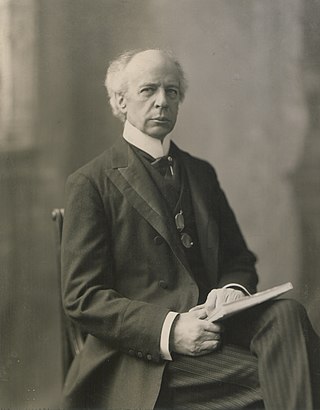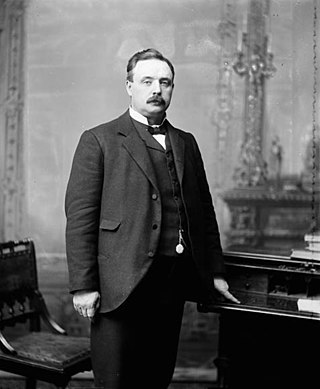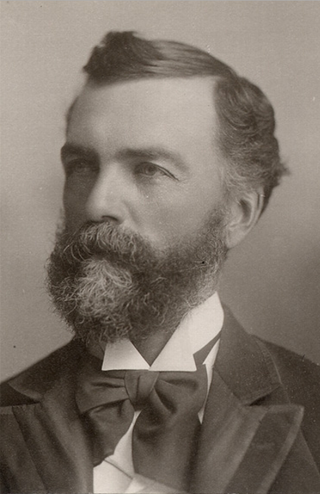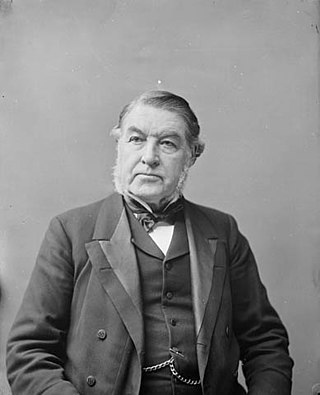
Sir Charles Tupper,1st Baronet,M.D. was a Canadian Father of Confederation who served as the sixth prime minister of Canada from May 1 to July 8,1896. As the premier of Nova Scotia from 1864 to 1867,he led Nova Scotia into Confederation. He briefly served as the Canadian prime minister,from seven days after parliament had been dissolved,until he resigned on July 8,1896,following his party's loss in the 1896 Canadian federal election. He is the only medical doctor to have ever held the office of prime minister of Canada and his 68-day tenure as prime minister is the shortest in Canadian history.

Sir John Alexander Macdonald was the first prime minister of Canada,serving from 1867 to 1873 and from 1878 until his death in 1891. He was the dominant figure of Canadian Confederation,and had a political career that spanned almost half a century.

Sir Mackenzie Bowell was a Canadian newspaper publisher and politician,who served as the fifth prime minister of Canada,in office from 1894 to 1896.

Sir Henri Charles Wilfrid Laurier,was a Canadian lawyer,statesman,and politician who served as the seventh prime minister of Canada from 1896 to 1911. The first French Canadian prime minister,his 15-year tenure remains the longest uninterrupted term of office among Canadian prime ministers and his nearly 45 years of service in the House of Commons is a record for the House. Laurier is best known for his compromises between English and French Canada.

Sir John Joseph Caldwell Abbott was a Canadian lawyer and politician who served as the third prime minister of Canada from 1891 to 1892. He held office as the leader of the Conservative Party.

The Progressive Conservative Party of Canada was a centre to centre-right federal political party in Canada that existed from 1942 to 2003.

The Conservative Party of Canada was a major federal political party in Canada that existed from 1867 to 1942. The party adhered to traditionalist conservatism and its main policies included strengthening relations with Great Britain,nationalizing industries,and promoting high tariffs.
The Liberal-Conservative Party was the formal name of the Conservative Party of Canada until 1873,and again from 1922 to 1938,although some Conservative candidates continued to run under the label as late as the 1911 election and others ran as simple Conservatives before 1873. In many of Canada's early elections,there were both "Liberal-Conservative" and "Conservative" candidates;however,these were simply different labels used by candidates of the same party. Both were part of Sir John A. Macdonald's government and official Conservative and Liberal-Conservative candidates would not,generally,run against each other. It was also common for a candidate to run on one label in one election and the other in a subsequent election.

The 1896 Canadian federal election was held on June 23,1896,to elect members of the House of Commons of Canada of the 8th Parliament of Canada. Though the Conservative Party,led by Prime Minister Charles Tupper,won a plurality of the popular vote,the Liberal Party,led by Wilfrid Laurier,won the majority of seats to form the next government. The election ended 18 years of Conservative rule.

Sir Joseph-Adolphe Chapleau,born in Sainte-Thérèse,Quebec,was a French-Canadian lawyer and politician who served as the 7th Lieutenant Governor of Quebec from 1892 to 1898.

Sir Hugh John Macdonald,was the only surviving son of the first prime minister of Canada,John A. Macdonald. He too was a politician,serving as a member of the House of Commons of Canada and a federal cabinet minister,and briefly as the eighth premier of Manitoba.
The Conservative Party of Quebec was a political party in Quebec,Canada,from 1867 until 1936,when it merged with members of the Action libérale nationale to form the Union Nationale.

Sir Charles Hibbert Tupper was a Canadian lawyer and politician.

Walter Humphries Montague,was a Canadian politician. He was a federal cabinet minister in the governments of Mackenzie Bowell and Charles Tupper,and subsequently a provincial cabinet minister in the Manitoba government of Rodmond Roblin. Montague was a member of the Conservative Party of Canada.

The 6th Canadian Parliament was in session from April 13,1887,until February 3,1891. The membership was set by the 1887 federal election on February 22,1887. It was dissolved prior to the 1891 election.

Joseph-Israël Tarte,was a Canadian politician and journalist.

Sir Frank Smith,was a Canadian businessman and senator. He was born in County Armagh in Ireland and in 1832 came to Canada with his family and his father established a farm in Etobicoke.

The Sixth Canadian Ministry was the cabinet chaired by Prime Minister Sir Mackenzie Bowell. It governed Canada from 21 December 1894 to 27 April 1896,including only the last year of the 7th Canadian Parliament. The government was formed by the old Conservative Party of Canada.

This article is the Electoral history of Sir Mackenzie Bowell,the fifth Prime Minister of Canada. A Conservative,he became prime minister upon the sudden death in office of Prime Minister Sir John Thompson in 1894. Bowell served a short term of just over one year as prime minister (1894-1896),until he was forced to resign over the Manitoba Schools Question. He never led his party in a general election. When he died in 1917,he was one of the last surviving members of the first House of Commons of Canada elected in 1867.

This article is the Electoral history of Sir Charles Tupper,the sixth Prime Minister of Canada. A Conservative,he became prime minister upon the resignation of Prime Minister Sir Mackenzie Bowell over the Manitoba Schools Question in 1896. Tupper was the shortest-serving prime minister,with a term of only 69 days. He led his party in two general elections and lost both,to Sir Wilfrid Laurier

















